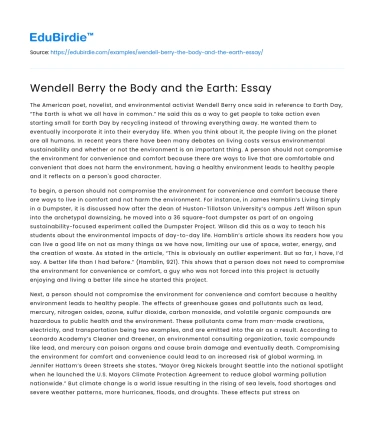The American poet, novelist, and environmental activist Wendell Berry once said in reference to Earth Day, “The Earth is what we all have in common.” He said this as a way to get people to take action even starting small for Earth Day by recycling instead of throwing everything away. He wanted them to eventually incorporate it into their everyday life. When you think about it, the people living on the planet are all humans. In recent years there have been many debates on living costs versus environmental sustainability and whether or not the environment is an important thing. A person should not compromise the environment for convenience and comfort because there are ways to live that are comfortable and convenient that does not harm the environment, having a healthy environment leads to healthy people and it reflects on a person's good character.
To begin, a person should not compromise the environment for convenience and comfort because there are ways to live in comfort and not harm the environment. For instance, in James Hamblin’s Living Simply in a Dumpster, it is discussed how after the dean of Huston-Tillotson University’s campus Jeff Wilson spun into the archetypal downsizing, he moved into a 36 square-foot dumpster as part of an ongoing sustainability-focused experiment called the Dumpster Project. Wilson did this as a way to teach his students about the environmental impacts of day-to-day life. Hamblin’s article shows its readers how you can live a good life on not as many things as we have now, limiting our use of space, water, energy, and the creation of waste. As stated in the article, “This is obviously an outlier experiment. But so far, I have, I’d say. A better life than I had before.” (Hamblin, 921). This shows that a person does not need to compromise the environment for convenience or comfort, a guy who was not forced into this project is actually enjoying and living a better life since he started this project.
Next, a person should not compromise the environment for convenience and comfort because a healthy environment leads to healthy people. The effects of greenhouse gases and pollutants such as lead, mercury, nitrogen oxides, ozone, sulfur dioxide, carbon monoxide, and volatile organic compounds are hazardous to public health and the environment. These pollutants come from man-made creations, electricity, and transportation being two examples, and are emitted into the air as a result. According to Leonardo Academy’s Cleaner and Greener, an environmental consulting organization, toxic compounds like lead, and mercury can poison organs and cause brain damage and eventually death. Compromising the environment for comfort and convenience could lead to an increased risk of global warming. In Jennifer Hattam’s Green Streets she states, “Mayor Greg Nickels brought Seattle into the national spotlight when he launched the U.S. Mayors Climate Protection Agreement to reduce global warming pollution nationwide.” But climate change is a world issue resulting in the rising of sea levels, food shortages and severe weather patterns, more hurricanes, floods, and droughts. These effects put stress on the economy due to a hike in health costs and the estimated fifty thousand premature deaths associated with exposure to air pollution.
Lastly, a person should not compromise the environment for comfort and convenience because it shows good character. Like Wendell Berry said, “The Earth is what we all have in common.” Humans get so many things to survive like clean air, food, water, materials to build shelters, medicine even things like nutrients and climate from nature at no cost. But they often take advantage of most of those things, take so much but only give pollution back. Humans are the number one cause of pollution in the ocean and air and according to the U.S. Department of Commerce’s National Ocean Service, “Nonpoint source pollution can make river and ocean water unsafe for humans and wildlife.” Because most ocean pollution starts on land, things like plastic wrapping, straws, and bottles are endangering the marine ecosystems leading to suffering, malnutrition, and suffocation. In Ernie Smith's A Brief History of the Modern-Day Straw, the World's Most Wasteful Commodity, Smith discusses the history of the plastic straw how it started, and the problem of the modern-day straw. The impact of straws on the environment has always been extremely negative. From pollution to hurting animals all around the world, plastic is the real issue. Earth is home and to show their appreciation humans should protect and preserve the environment.
To conclude, Marco A. Ortiz the author of Science Direct’s Energy and Buildings, stated “Environmental and technological cues shape levels of comfort and strength of habits.” This means that these cues, such as hurricanes, floods, and droughts, are informing people that global warming and climate change are serious issues. In recent years there have been many debates on living costs versus environmental sustainability and whether or not the environment is an important thing. A person should not compromise the environment for convenience and comfort because there are ways to live that do not harm the environment, due to the fact that there are many examples of living a comfortable happy life not as many things as we have now. Having a healthy environment leads to healthy people and it reflects on your good character. Being kind to the environment is not always convenient, but it is worthwhile. Necessary, in fact. Plus, it’s very fulfilling.






 Stuck on your essay?
Stuck on your essay?

